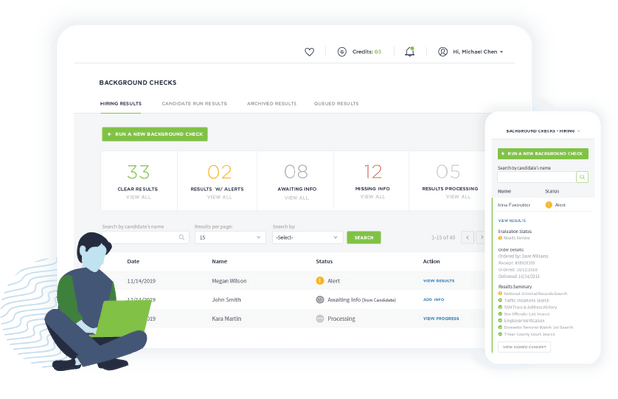8 Best Criminal Background Check Sites: Complete Comparison Guide
Whether searching court records for business or personal use, this list is a guide to the best criminal background check sites.
Click a chapter to scroll directly to it.
In Texas, employers often use background checks to evaluate a candidate’s eligibility and qualifications for a role. Though Texas doesn’t have statewide fair hiring restrictions, following federal guidelines and best practices can help you get the information you need while maintaining a fair and compliant hiring process. Keep reading to learn more about Texas background checks.

A Texas background check searches public records and other data sources to gather information about a candidate or employee, such as the individual’s criminal history, driving record, or employment and education history. Employers often conduct background checks in Texas before bringing job candidates or volunteers onboard; some may also conduct routine background screenings for current employees.
For example, employers in Texas may require background checks for certain jobs, such as fingerprint-based criminal background checks for public school employees and Texas Department of Family and Protective Services workers and volunteers. These screenings help ensure the safety and security of children and vulnerable Texans.
Employers can choose to conduct their own state of Texas background check for employment or partner with a consumer reporting agency (CRA), like GoodHire. Using a DIY approach can be time-consuming and typically involves contacting law enforcement agencies and courthouses or manually searching databases and court records. Other types of screenings, like education verification or checking professional references, may also require a more hands-on approach.
Working with a qualified background check provider, like GoodHire, helps reduce the workload for busy HR teams and mitigate risk for potential compliance issues. GoodHire’s easy-to-use online platform with automated workflows, streamlines the process and provided fast, accurate results.

What shows up on a Texas background check depends upon the type of searches conducted; federal, state, and local laws regulating background checks; and the employer’s background screening policy.
Here are common state of Texas background checks and what may be reported:
Texas background checks can help employers make informed hiring decisions while minimizing risk. Partnering with a qualified background check provider, like GoodHire, can streamline the process and deliver the results you need with speed, accuracy, and service. We offer 100+ screening options to meet the needs of businesses of all sizes, with a mobile-optimized platform and automated workflows to help make the background check process efficient for you and your candidates. Get started today.

The resources provided here are for educational purposes only and do not constitute legal advice. We advise you to consult your own counsel if you have legal questions related to your specific practices and compliance with applicable laws.
Whether searching court records for business or personal use, this list is a guide to the best criminal background check sites.
If your employees, contractors, or volunteers drive for your company or operate a company vehicle during work hours, their driving history may be important to you.
Background checks look for different results and cover different lengths of time. Learn about the length of history that can be checked legally and used compliantly.